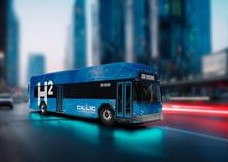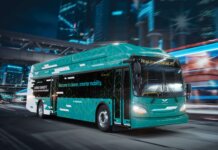Hexagon Purus, a supplier of zero-emission mobility solutions, has entered into a multi-year supply agreement with GILLIG, a designer and manufacturer of heavy-duty transit buses in the United States, for the supply of hydrogen fuel storage systems for GILLIG’s new fuel cell-powered transit buses.
The delivery of hydrogen fuel storage systems will be supplied from Hexagon Purus’ facility in Westminster, Md.
“Introducing a hydrogen-powered fuel cell bus into our product lineup signifies GILLIG’s commitment to advancing sustainable public transportation technologies,” says Ben Grunat, GILLIG’s vice president of Product Planning and Strategy. “It’s about offering a solution that’s not only flexible enough to fit every fleet, but also matured through our thoughtful approach to product development, ensuring reliability and readiness for the demands of today’s transit environment.”
“Entering into a long-term agreement with GILLIG confirms our strong market position with leading transit bus OEMs in both North America and Europe,” adds Michael Kleschinski, executive vice president of Hexagon Purus. “There is a strong commercial momentum in the transit bus segment driven by demand for zero emission public transport solutions.”
The mobility sector is accountable for approximately 20% of annual carbon emissions globally, and hydrogen has a significant role to play in reducing these emissions, particularly in “hard to abate” sectors. Making green hydrogen available for use in the mobility sector is critical to reduce carbon emissions.
As hydrogen, a key contributor to the energy transition, continues to build momentum globally, more than 30 nations have released hydrogen roadmaps. According to the Hydrogen Council, the number of announced hydrogen projects grew in 2023 by about 35% to over 1,400, or $570 billion of investments. Green hydrogen is projected to supply up to 25% of the world’s energy needs by 2050.






